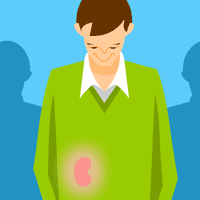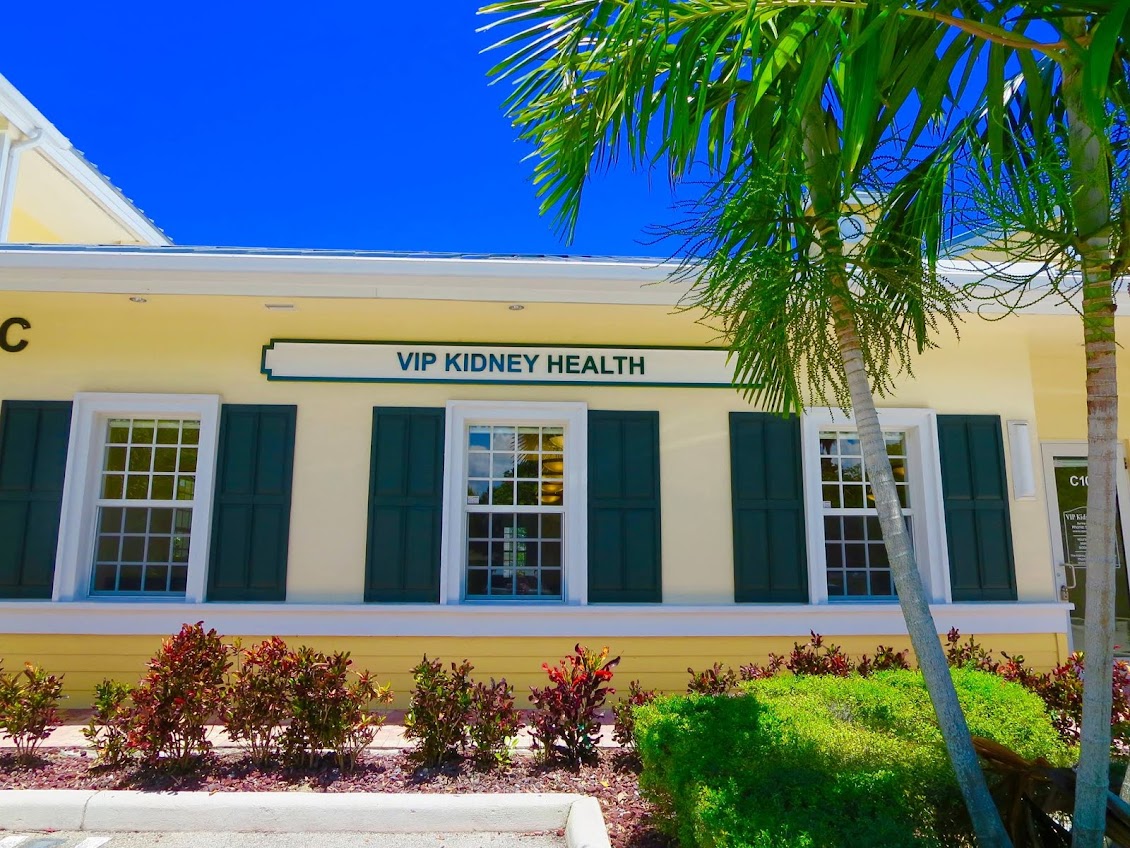Potassium is an electrolyte(mineral salt)important to the functioning of our bodies.People can suffer from insufficient potassium(hypokalemia)or too much potassium(hyperkalemia). Hypokalemia can cause weakness, fatique, confusion and heart irregularities. This can occur with starvation, excessive sweating or use of laxatives and diuretics.
More common in the kidney patient is high potassium or hyperkalemia. A failing kidney-even in the early stages of kidney disease-can in some cases fail to metabolize minerals properly resulting in a need to restrict dietary intake of potassium. Left untreated, new research suggests, hyperkalemia may cause nerve damage and can cause cardiac instability and even be fatal in extreme cases.
That's why we take your potassium level so seriously. The first time it is high we may simply repeat it and discuss your diet with you. Often it is one or two high potassium foods that need to be curtailed in order to bring the level down. If following our diet suggestion fails to bring your potassium down(or does not keep it down consistently,) we will refer you to a renal(kidney)dietcian who can more specifically work on your diet with you.
In some cases we will prescribe a medicine which helps to pull potassium from your body in your stool. We do not use this method until diet manipulation has failed as it can produce other side effects such as diarrhea.
We will review your diet with you. It may be possible another doctor gave you a potassium supplement(it has happened!) or you maybe taking a drug that raises the level such as certain blood pressure drugs. We ask that you bring in the OTC drugs and vitamins you take so we can assess them. Salt substitue can also elevate the value if it is made of potassium.
Luckily since 2001 potassium content is required on food labels making it easier to follow the amount you are taking in.
The attached link gives suggestions on foods that are high-moderate-or low in potassium. You can also print out such a list from the main page of our website. For more specific dietary suggestions we reccommend you check with a dietcian who can creat a diet plan for you.
Together-your doctor, nutritionist and YOU-we can conquer your high potassium(or low)problem. We ask that you follow the diet, comply with requests for labs and keep us informed of any new drugs you may be taking-prescribed or otherwise.
Posted by Barbara Kissane R.N.,Editor at 11:56 AM 0 comments Links to this post
Labels: High Potassium
South Florida leading Nephrology practice and Florida's ONLY Certified Hyperension Center, THE KIDNEY & HYPERTENSION GROUP, reports and discusses the latest news effecting your kidney and vascular health. Learn why we are the top rated kidney practice, every year, in every poll. (954)771-3929
Translate
University of Miami Miller School of Medicine Nephrology Faculty

Tuesday, February 2, 2010
Subscribe to:
Post Comments (Atom)
Black Americans Are At High Risk of Kidney Disease. Click Picture To Learn What Can Be Done
Popular Posts
-
Causes of High Potassium High levels of potassium in blood cause a condition known as hyperkalemia. A kidney disorder is the major cause of...
-
LETTERS Kidney Warning (1 Letter) Published: August 13, 2012 To the Editor: Re “Transplant Centers Struggle With Donors’ Obesity” (Aug...
-
UCSF unveils model for implantable artificial kidney to replace dialysis UCSF researchers today unveiled a prototype model of the first i...
-
April is National Donate Life Month, and if you're thinking about donating a kidney, now would be the time to find out what it's all...
-
THE KIDNEY GROUP'S DR. GABRIEL VALLE HAS BEEN CHOSEN AGAIN TO "BEST DOCTORS" WHICH IS A WORLD CLASS PANEL OF EXPERTS, CHOSEN B...
-
You can't have a healthy heart without healthy blood pressure, so see your doctor or health-care professional for a reading. An accurate...
-
10 Facts (And Myths) About Lupus Lupus is a chronic, autoimmune disease that can damage any part of the body (skin, joints, and/or organ...
-
Several patients have called, alarmed with news reports that patients with #kidney stones face a higher incidence of end stage renal disease...
-
There's a dangerous health problem on the rise in the United States, affecting more than 20 million adults—25 percent more than a decade...
-
There's 3 TOP Nephrologists in Broward County..and you're looking at them! (L to R Drs. Gabriel Valle, Chief of Medicine, Holy Cr...
Post Titles
- "Kindest Cut" New Yorker 2009
- 10 TIPS FOR A HEALTHY BLOOD PRESSURE
- 25 Wonderful Years With Her Husband's Kidney
- A Diet That Works For Both Hypertension and Gout
- A Heartfelt Thank You
- AJKD ARTICLE ON HYPERTENSION IN DIALYSIS PATIENTS
- ALL ABOUT CKD
- All About Potassium
- An Inspiration to Patients Awaiting Transplant
- Barbara Kissane Valle
- Barbara Valle
- Becoming An Organ Donor Impacts Many Lives
- Being on multiple transplant lists makes sense
- BEJAR IPMC MVP CANDIDATE
- Broccoli For Preventing Hypertension
- Captain Ladino sent to Kosovo
- CARLOS BEJAR M.D. OF THE KIDNEY GROUP DISCUSSES PREVENTING DIABETIC KIDNEY DISEASE
- CDC Answers Questions on Ebola Safety
- Charlie debuts at the Kidney Group
- Cheetos lip balm curbing cravings?
- CNS
- Common High Potassium Foods
- Common Symptoms of Zika Virus
- Control your Blood Pressure Naturally
- Covid 19 vs Flu Pandemic of 1918
- Cranberry juice and UTI
- DANGERS OF VARIABLE BP
- David Kessler's book on" Junk Food Epidemic"
- DEATH OF DR. ROBERT GERONEMUS LEAVES VOID
- DEATH OF THOMAS HERRION RAISING QUESTIONS
- DEFINING HEMATURIA
- DESPERATE HOUSEWIVES TACKLES ESRD
- Determining Your Ideal Weight
- DIABETES MANAGEMENT IS KEY
- DIABETES MYTH #1
- Diabetes Tsunami
- Dialysis Catheters Increase Risk of Death
- dIALYSIS PATIENT STILL RACING HORSES
- DID CELEBRITY GET NATALIE COLE HER QUICK KIDNEY?
- DIET CAN LOWER YOUR RISK OF DIABETES
- DR OZ ON KIDNEY DISEASE
- Dr Valle Sweeps Top Doctor in Palm Beach and Broward Again
- Dr. Ameen Waheed to Chair UM Nephrotic Syndrome Symposium Section
- Dr. Bejar's new puppy
- Dr. Carlos Bejar
- Dr. Gabriel Valle and Dr. Carlos Bejar named Best Kidney Doctors in Palm Beach County
- Dr. Gabriel Valle and Dr. Carlos Bejar Named Top Doctors in Nephrology and Hypertension for 15th year in a Row
- DR. GABRIEL VALLE CHOSEN "BEST DOCTOR" AGAIN FOR 2011.
- DR. GABRIEL VALLE DISCUSSES FUTURE HOPE IN CKD
- Dr. Gabriel Valle Discusses Protein and Your Kidney
- Dr. Gabriel Valle has first patient accepted into Paired Donor Program at UM
- DR. GABRIEL VALLE NAMED TOP NEPHROLOGIST BY BOCA LIFE MAGAZINE
- Dr. Gabriel Valle Top Kidney Doctor 18th Year In A Row
- Dr. Jorge Ajuria is now a Fellow of the American Society of Nephrology
- Dr. Marco Ladino joins KidneyWorld Editorial Board
- ELEVATED BLOOD PRESSURE LEADING CAUSE OF EARLY DEATH
- EXPANDED DONOR CHOICES
- Expanded Transplant Options with The Kidney & Hypertension Group
- Expert Care
- FACE IT-WE'RE FAT
- Facebook for Kidney patients en Espanol
- FERNANDA'S OWNER HAS KIDNEY TRANSPLANT
- FIGURE OUT YOUR KIDNEY RISK
- Florida's Leading Peritoneal Dialysis Provider
- Follow the most popular Kidney Medicine practice on Facebook
- Fort Lauderdale's Kidney Group leads state in # of kidney transplants
- FRIEND DONATES KIDNEY TO LOCAL WOMAN
- Gabriel Valle M.D. Now Fellow of the ASH
- GEORGE LOPEZ TRANSPLANT PART OF A GROWING TREND
- Harvard
- He Got the Kidney
- High Potassium
- HISTORY OF CANCER DOES N'T PRECLUDE TRANSPLANT
- Home Dialysis
- HOME DIALYSIS OPTIONS
- How Does The Kidney & Hypertension Group Transplant So Many Patients?
- How To Prevent Kidney Stones
- IMPC MVP
- IMPORTANT INFORMATION ON PHOSPHORUS
- Improving Kidney Health at the KHG
- Infertility and Hypertension Link
- INSIDER TIPS ON GETTING A KIDNEY TRANSPLANT
- Insiders Tips on Getting a Kidney Transplant
- Juliette Valle is Miss Broward County's Outstanding Teen 2016
- KEEP YOUR KIDNEYS WORKING WELL
- Keep Your Potassium In The Normal Range With These Tips
- Kidney & Hypertension Group In Fort Lauderdale Voted Florida's Best Again
- Kidney and Hypertension Group has Florida's top Home Dialysis Program
- KIDNEY COSTS WILL CONTINUE TO SOAR
- KIDNEY DIVORCE WAR HEATS UP
- Kidney Docs Tell You 3 Easy Ways To PREVENT Kidney Stones
- Kidney Doctors Offer Same Dat Appointment
- KIDNEY GROUP DEBATES KIDNEY RATIONING
- KIDNEY GROUP KIDNEY-PANCREAS PATIENT WINS OLYMPIC GOLD
- KIDNEY GROUP PATIENT WINS GOLD AT TRANSPLANT OLYMPICS
- KIDNEY TRANSPLANT:THE KINDNESS OF STRANGERS
- Learn how to keep your kidneys healthy for life
- LETS TALK ABOUT A KIDNEY TRANSPLANT
- Lipid Management In Kidney Disease-New Guidelines
- Living Successfully With HIV and Kidney Disease
- LIVING WITH POLYCYSTIC KIDNEY DISEASE IN 2008
- LOOKING OUT FOR KIDNEY PATIENTS IN THE PANDEMIC THREAT
- Love is good for you
- LOWER YOUR BLOOD PRESSSURE WITHOUT DRUGS
- MAKE YOUR OWN LUCK IN GETTING A TRANSPLANT
- Marco Ladino of The Kidney Group in Fort Lauderdale wins award from Florida Society of Nephrology
- Medicine and Media
- Meet Dr
- Minimize Your Radiation Exposure During Pre Transplant Workup
- More Kidney Transplant Success Stories at The Kidney and Hypertension Group of South Florida
- NEPHROLOGIST GIVES KIDNEY TO WIFE
- Never mind your sign..what's your BUN?
- NO CLENCHED FISTS
- NOBODY KEEPS BABY IN A CHAIR
- Number 1 of the 6 Phases of Successful Weight Loss
- Our first kidney transplant of 2012
- PATIENTS CAN PREVENT MED ERRORS
- Peritoneal Dialysi patient loses 90 lbs in 6 weeks
- PERITONEAL DIALYSIS MAKES SENSE FOR MANY KIDNEY FAILURE PATIENTS
- Peritoneal Dialysis Nurse
- Plans for Artificial Kidney Unveiled
- PREDICTING ODDS OF TRANSPLANT SUCCESS
- PREGNANCY IN CHRONIC KIDNEY DISEASE-A REVIEW
- Preserving Residual Renal Function In Dialysis Patients
- PREVENTING DIABETES
- PREVENTING FALSELY ELEVATED POTASSIUM LEVELS
- Preventing Kidney Disease
- Prevention Of Kidney Disease Through Drinking More Water-A Study
- Professor Gabriel Valle Greets His Students
- Quality in Dialysis
- Rapheal Baez
- Rapid Response Clinic at the Kidney and Hypertension Group decreases hospital admissions and ER visits
- reachs pre-transplant weight goal
- RESTLESS LEGS SYNDROME
- Seeing a Nephrologist Early in The Course Of Kidney Disease Improves Outcomes
- SHALL WE ?
- SODIUM BICARB UPDATE FROM JASN
- STOP HYPERTENSION BEFORE IT STOPS YOU
- Stop today and think about your kidneys
- Taking A Correct Home Blood Pressure Reading
- Tenofovir Use and the Kidney
- THE FIRST TRANSPLANT-A BRAVE TWIN BROTHER DONATES
- The Health Ranger speaks out on Vitamin D
- The Kidney & Hypertension Group Doubled It's Office Space In Fort Lauderdale To Meet Patient Demand
- The Kidney & Hypertension Group-Kidney Transplant Advocates
- The Kidney and Hypertension Group is Named Top U.S. Hypertension Center
- The Kidney And Hypertension Group Now Offers Same Day Appointments For Urgent Care
- The Kidney Group Again Named Best Nephrologists in Broward County
- THE KIDNEY GROUP OF SOUTH FLORIDAS DOCTORS ALL CHOSEN AS TOP PHYSICIANS
- The Kidney Group-Florida's Top Nephrology Practice plans a 3rd office in Coconut Creek
- The Leading Cause of Kidney Failure
- The Secret Revealed
- THE SQUEAKY WHEEL GETS THE TRANSPLANT
- Thoughts on RPA 2011
- TOOLS TO HELP YOU REACH YOUR GOALS
- Top Kidney Care At Best Prices
- Top Kidney Doctors Are Also The Most Affordable"
- Top Kidney Doctors Come To Coconut Creek - Parkland
- Treating BK Virus After Kidney Transplant
- Treatment of Resistant Hypertension in South Florida
- Understanding the Stages of Chronic Kidney Disease
- Understanding Your Kidneys
- United States Oldest Kidney Donor
- UNTIL WE CONTROL DIABETES
- Update on Mary's kidney.
- Urine test for Cancer and Diabetes
- Vanessa Williams and Diabetes
- VIPKidney Health is Florida's Top Luxury Dialysis Provider
- VITAMIN D: KEY TO LONGEVITY?
- Weight Loss Surgery in Pre-Transplant Patients
- What a week-4 of Dr. Gabriel Valle's patients get kidney transplants at UM in one week
- What causes blood in the urine?
- WHAT CAUSES HIGH POTASSIUM?
- What dialysis method woudl your doctor choose for himself?
- What Is Calciphylaxis and What Can Be Done About It
- WHAT IS CKD?
- What Is Metabolic Syndrome
- WHAT IS PROTEINURIA?
- What PCP's Need To Understand About Peritoneal Dialysis
- WHO GETS THE GOOD KIDNEY?
- will present her abstract of Gastric Bypass Surgery in Peritoneal Dialysis Patients in San Antonio at The Annual Dialysis Conference
- World Kidney Day-Promoting Better Kidneys
- WORLD'S FIRST ORGAN DONOR DIES AT 79
- YOU CAN PREVENT DIABETIC KIDNEY DAMAGE
- You Need a PD Catheter or AV Fistula
- Young Adults and Hypertension
- YOUR BODY KNOWS ITS PERFECT WEIGHT. LISTEN TO IT.
- YOUR KIDNEYS AND ANTIBIOTICS
CONGRATULATIONS TO THE KIDNEY GROUP'S NEW TRANSPLANT PATIENTS

Van C. (Dr. Gabriel Valle's patient-kidney-University of Miami, Cathy O. (Dr. Carlos Bejar-Kidney at University of Miami),Will E. (Dr. Ajuria-kidney-Miami Transplant Institute;Bob I. (Dr. Valle's patient, University of Miami-Kidney), Orlando T. (Dr. Valle's patient, University of Miami, kidney), Sara A. (Dr. Valle's patient, kidney, University of Miami),Steve I. (Dr. Jorge Ajuria's patient, kidney, University of Miami),Sandy L. (Dr. Carlos Bejar's patient, kidney, University of Miami),KATHY C. (kidney-University of Miami, patient of Dr. Valle,MARTIN O. (Dr. Valle patient-Heart/Kidney -University of Miami), ROBERT I. (Dr. Valle's patient Kidney at University of Massachusetts), DREW P.(kidney-University of Florida),BILL L. (University of Florida-kidney), BARBARA L. (University of Miami-kidney), FRANCIS L. (kidney at U. of F.), JONATHAN I. (kidney-at U of F), THERESA L. (kidney-pancreas at University of Miami),JEFF T. (kidney at University of Florida), TERESA R. (kidney-University of Miami), JEANNIE O. (kidney-University of Florida), ELOISE O. (Univ of Florida), JOHN E. (kidney-University of Florida), GENE J. (Kidney-University of South Florida), CAL. M. (kidney- Florida Transplant Hospital in Orlando), TERRY A. (Perfect Match! University of Florida-kidney), TIM A.(kidney-University of Miami), GLORIA R. (kidney -University of Miami), BRAD R. (Kidney (and never on dialysis!!)-at University of Miami),(*both Brad and Gloria got kidneys on the same day!!!), BELINDA (kidney-University of Miami), TOM (kidney-University of Miami), JIM E. (Kidney-University of Miami), HERBERT A., (Kidney-University of Miami), Belinda R. (University of Miami-kidney),
PATRICK LOVES THE KIDNEY GROUP

THE DOCTORS OF THE KIDNEY GROUP
Living longer by living smarter.

find 20 minutes a day to meditate. It reduces stress, lowers blood pressure, and reduces signs of aging.








No comments:
Post a Comment